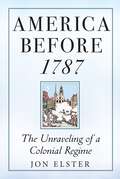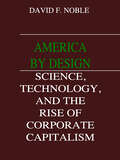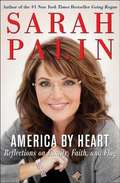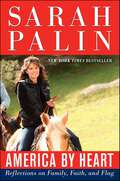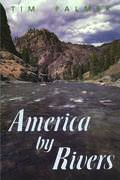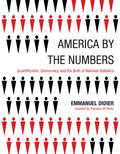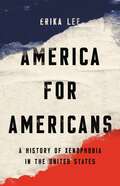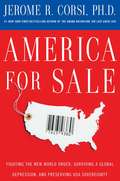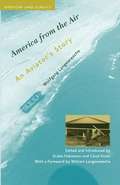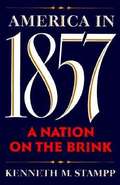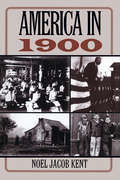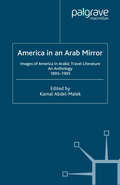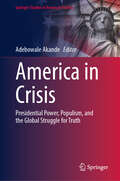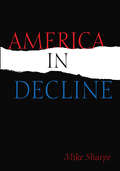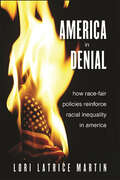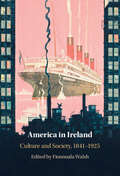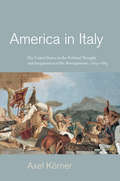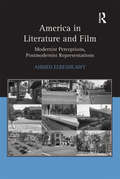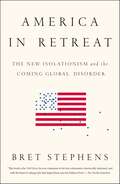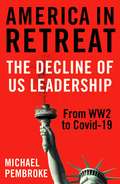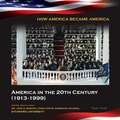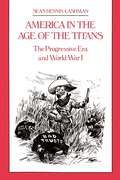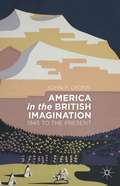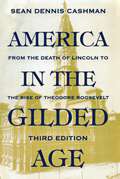- Table View
- List View
America before 1787: The Unraveling of a Colonial Regime
by Jon ElsterAn original account, drawing on both history and social science, of the causes and consequences of the American RevolutionWith America before 1787, Jon Elster offers the second volume of a projected trilogy that examines the emergence of constitutional politics in France and America. Here, he explores the increasingly uneasy relations between Britain and its American colonies and the social movements through which the thirteen colonies overcame their seemingly deep internal antagonisms.Elster documents the importance of the radical uncertainty about their opponents that characterized both British and American elites and reveals the often neglected force of enthusiasm, and of emotions more generally, in shaping beliefs and in motivating actions. He provides the first detailed examinations of &“divide and rule&” as a strategy used on both sides of the Atlantic and of the rise and fall of collective action movements among the Americans. Elster also explains how the gradual undermining in America of the British imperial system took its toll on transatlantic relations and describes how state governments and the American Confederation made crucial institutional decisions that informed and constrained the making of the Constitution.Drawing on a wide range of historical sources and on theories of modern social science, Elster brings together two fields of scholarship in innovative and original ways. The result is a unique synthesis that yields new insights into some of the most important events in modern history.
America by Heart: Reflections on Family, Faith, and Flag
by Sarah PalinIn the fall of 2009, with the publication of her #1 national bestselling memoir, Sarah Palin had the privilege of meeting thousands of everyday Americans on her extraordinary 35-city book tour. Inspired by these encounters, her new book, America By Heart: Reflections on Family, Faith, and Flag, celebrates the enduring strengths and virtues that have made this country great. Framed by her strong belief in the importance of family, faith, and patriotism, the book ranges widely over American history, culture, and current affairs, and reflects on the key values-both national and spiritual-that have been such a profound part of Governor Palin's life and continue to inform her vision of America's future. Written in her own refreshingly candid voice, America By Heart will include selections from classic and contemporary readings that have moved her-from the nation's founding documents to great speeches, sermons, letters, literature and poetry, biography, and even some of her favorite songs and movies. Here, too, are portraits of some of the extraordinary men and women she admires and who embody her deep love of country, her strong rootedness in faith, and her profound love and appreciation of family. She will also draw from personal experience to amplify these timely (and timeless) themes-themes that are sure to inspire her numerous fans and readers all across the country.
America by Heart: Reflections on Family, Faith, and Flag
by Sarah PalinIn the fall of 2009, with the publication of her #1 national bestselling memoir, Sarah Palin had the privilege of meeting thousands of everyday Americans on her extraordinary 35-city book tour. Inspired by these encounters, her new book, America By Heart: Reflections on Family, Faith, and Flag, celebrates the enduring strengths and virtues that have made this country great.Framed by her strong belief in the importance of family, faith, and patriotism, the book ranges widely over American history, culture, and current affairs, and reflects on the key values—both national and spiritual-that have been such a profound part of Governor Palin’s life and continue to inform her vision of America’s future. Written in her own refreshingly candid voice, America By Heart will include selections from classic and contemporary readings that have moved her-from the nation’s founding documents to great speeches, sermons, letters, literature and poetry, biography, and even some of her favorite songs and movies. Here, too, are portraits of some of the extraordinary men and women she admires and who embody her deep love of country, her strong rootedness in faith, and her profound love and appreciation of family. She will also draw from personal experience to amplify these timely (and timeless) themes—themes that are sure to inspire her numerous fans and readers all across the country.
America by Rivers
by Tim PalmerPhotographer and writer Tim Palmer has spent more than 25 years researching and experiencing life on the waterways of the American continent. He has travelled by canoe or raft on more than 300 different rivers, down wide placid streams and rough raging rapids. His journeys have taken him to every corner of the country, where he has witnessed and described the unique interaction of geographical, historical, and cultural forces that act upon our nation's vital arteries.America by Rivers represents the culmination of that grand adventure. Palmer describes the rivers of America in all their remaining glory and tarnished beauty, as he presents a comprehensive tour of the whole of America's river systems. Filled with important new information as well as data gathered from hundreds of published sources, America by Rivers covers: the network of American waterways and how they fit together to form river systems unique features of individual rivers along with their size, length, and biological importance environmental problems affecting the rivers of different regions and what is being done to protect and restore them cultural connections and conflicts surrounding the rivers of each region Chapters address the character of rivers in distinct regions of the country, and each chapter highlights one river with a detailed view from the water. Rivers profiled include the Penobscot, Potomac, Suwanee, Minnesota, Niobara, Salmon, Rio Grande, American, Rogue, and Sheenjek. Eighteen maps guide the reader across the country and 100 photos illustrate the splendor of Palmer's fascinating subject.America by Rivers provides a new way of seeing our country, one that embraces the entire landscape and offers fresh avenues to adventure. It is compelling reading for anyone concerned about the health of our land and the future of our waterways.
America by the Numbers: Quantification, Democracy, and the Birth of National Statistics (Infrastructures)
by Emmanuel DidierHow new techniques of quantification shaped the New Deal and American democracy.When the Great Depression struck, the US government lacked tools to assess the situation; there was no reliable way to gauge the unemployment rate, the number of unemployed, or how many families had abandoned their farms to become migrants. In America by the Numbers, Emmanuel Didier examines the development in the 1930s of one such tool: representative sampling. Didier describes and analyzes the work of New Deal agricultural economists and statisticians who traveled from farm to farm, in search of information that would be useful for planning by farmers and government agencies. Didier shows that their methods were not just simple enumeration; these new techniques of quantification shaped the New Deal and American democracy even as the New Deal shaped the evolution of statistical surveys.Didier explains how statisticians had to become detectives and anthropologists, searching for elements that would help them portray America as a whole. Representative surveys were one of the most effective instruments for their task. He examines pre-Depression survey techniques; the invention of the random sampling method and the development of the Master Sample; and the application of random sampling by employment experts to develop the “Trial Census of Unemployment.”
America for Americans: A History of Xenophobia in the United States
by Erika LeeAn award-winning historian reframes our continuing debate over immigration with a compelling history of xenophobia in the United States and its devastating impactThe United States is known as a nation of immigrants. But it is also a nation of xenophobia. In America for Americans, Erika Lee shows that an irrational fear, hatred, and hostility toward immigrants has been a defining feature of our nation from the colonial era to the Trump era. Benjamin Franklin ridiculed Germans for their "strange and foreign ways." Americans' anxiety over Irish Catholics turned xenophobia into a national political movement. Chinese immigrants were excluded, Japanese incarcerated, and Mexicans deported. Today, Americans fear Muslims, Latinos, and the so-called browning of America. Forcing us to confront this history, America for Americans explains how xenophobia works, why it has endured, and how it threatens America. It is a necessary corrective and spur to action for any concerned citizen.
America for Sale
by Jerome R CorsiA RESOUNDING CALL TO DEFEND AMERICA'S SOVEREIGNTY AND SAVE OUR NATION FROM GLOBAL ECONOMIC TAKEOVER-- FROM THE #1 NEW YORK TIMES BESTSELLING AUTHOR OF THE OBAMA NATION AND THE LATE GREAT US Between George H. W. Bush's "new world order" and the unprecedented governmental growth and massive redistribution of wealth under President Barack Obama, the United States risks losing the greatest middle class ever created in the history of the world. In this groundbreaking New York Times bestseller, Dr. Jerome R. Corsi blows the whistle on a movement to undercut the fundamental principles of limited government that our Founding Fathers fought for and died for trying to establish. While the radical Left promotes socialism and the radical Right champions unbridled free trade, valuable jobs are being outsourced, our national borders erased, and our dollar destroyed before our very eyes. With constructive solutions for resisting the global New Deal, reversing our dependence on foreign oil, and strengthening our middle class, Corsi shares important and practical strategies to help American families survive. The United States can be a major player in the world economy without sacrificing our sovereignty, the strength of our national domestic economy, or the dollar. America is for sale--unless taxpayers stand up and say "NO!" to the globalist political agenda that threatens our great nation's freedom. m.
America from the Air: An Aviator's Story
by Wolfgang LangewiescheA memoir of a pilot who learned to fly in the 1930's as well as a look at America from the air as it appeared in the 1940's. At the same time it is a study of the joys of flying.
America in 1857: A Nation on the Brink
by Kenneth StamppIt was a year packed with unsettling events. The Panic of 1857 closed every bank in New York City, ruined thousands of businesses, and caused widespread unemployment among industrial workers. The Mormons in Utah Territory threatened rebellion when federal troops approached with a non-Mormon governor to replace Brigham Young. The Supreme Court outraged northern Republicans and abolitionists with the Dred Scott decision ("a breathtaking example of judicial activism"). And when a proslavery minority in Kansas Territory tried to foist a proslavery constitution on a large antislavery majority, President Buchanan reneged on a crucial commitment and supported the minority, a disastrous miscalculation which ultimately split the Democratic party in two. In America in 1857 , eminent American historian Kenneth Stampp offers a sweeping narrative of this eventful year, covering all the major crises while providing readers with a vivid portrait of America at mid-century. Stampp gives us a fascinating account of the attempt by William Walker and his band of filibusters to conquer Nicaragua and make it a slave state, of crime and corruption, and of street riots by urban gangs such as New York's Dead Rabbits and Bowery Boys and Baltimore's Plug Uglies and Blood Tubs. But the focus continually returns to Kansas. He examines the outrageous political frauds perpetrated by proslavery Kansans, Buchanan's calamitous response and Stephen Douglas's break with the President (a rare event in American politics, a major party leader repudiating the president he helped elect), and the whirl of congressional votes and dramatic debates that led to a settlement humiliating to Buchanan--and devastating to the Democrats. 1857 marked a turning point, at which sectional conflict spun out of control and the country moved rapidly toward the final violent resolution in the Civil War. Stampp's intensely focused look at this pivotal year illuminates the forces at work and the mood of the nation as it plummeted toward disaster.
America in 1900
by Noel J KentMany of the key issues concerning the United States as we enter the 21st century were already taking shape as we entered the 20th century. Business mergers, U.S. military intervention (in the Philippines), trade disputes with China and Europe, racial violence, high levels of crime, rising income gaps between rich and poor, volatile stock market prices, homelessness in the cities, the dangers of immigration, and the domination of money in elections -- all these major national issues in 1900 are familiar in some form to Americans today. The nation grappled for the first time with a series of complex new challenges: distribution of wealth and economic opportunity; the form race and ethnic relations should take in a country of increasing diversity; the relationship between big business and government; how the United States, as a new world power, should act overseas; and a host of others. Written in a fluid and highly readable style, Kent's ten chapters comprise a colorful narrative history of the major events of this pivotal year that continues to resonate a century later.
America in An Arab Mirror: Images of America in Arabic Travel Literature: An Anthology
by K. Abdel-MalekThis distinguished anthology presents for the first time in English travel essays by Arabic writers who have visited America in the second half of the century. The view of America which emerges from these accounts is at once fascinating and illuminating, but never monolithic. The writers hail from a variety of viewpoints, regions, and backgrounds, so their descriptions of America differently engage and revise Arab pre-conceptions of Americans and the West. The country figures as everything from the unchanging Other, the very antithesis of the Arab self, to the seductive female, to the Other who is both praiseworthy and reprehensible.
America in Crisis: Presidential Power, Populism, and the Global Struggle for Truth (Springer Studies in American Politics)
by Adebowale AkandeThis book examines the far-reaching impact of charismatic leadership on voter behavior, media influence, and affective polarization. In this context, emotional reactions to opposing parties fuel societal division. Trump&’s political messaging consistently portrays former President Joe Biden as America&’s scapegoat, deepening partisan conflicts and shaping public perception. As President Donald Trump begins his second term, the U.S. is facing deep political division, economic uncertainty, and institutional distrust. His administration&’s sweeping policy shifts, including aggressive tariffs, corporate deregulation, and strict immigration measures, have triggered economic disruptions and global instability. Meanwhile, ideological and emotional polarization deepens, driven by personality politics and the rise of "strong leader" authoritarianism. This volume examines the American presidency, offering insights from the past and a prescient look at the potential ramifications of "Trump 2.0" on the domestic political landscape and the global stage. This book will appeal to scholars, policymakers, and anyone interested in the future of U.S. politics as it emphasizes the importance of understanding and addressing polarization to promote a more inclusive and effective political dialogue.
America in Decline
by Leon Sharpe"This collection gathers 91 essays that appeared in the pages of Challenge from 1973 through 2011."
America in Denial: How Race-Fair Policies Reinforce Racial Inequality in America (SUNY series in African American Studies)
by Lori Latrice MartinIn America in Denial Lori Latrice Martin examines the myth of a race-fair America by reviewing and offering alternatives to universal, race-neutral programs and policies as well as other allegedly race-neutral initiates. By considering policies and programs related to wealth, health, education, and criminal justice, while presenting themselves as race-neutral, Martin reveals that black scholars and politicians, in particular, seemingly capitulate and have become proponents of these programs and policies that perpetuate the myth of a race-fair America. This (mis)use provides cover for elected officials and presidential hopefuls needed to garner the support and authenticity required to increase public support for their initiatives. These issues must be unpacked and debunked, and the material and nonmaterial harm historically done to black people, and still felt today, must be acknowledged. The idea that programs available to all people will benefit black people is demonstratively untrue, and the alternatives presented in America in Denial will generate much-needed conversations.
America in Ireland: Culture and Society, 1841–1925
by Fionnuala WalshWhile the impacts of Irish emigration to America following the Great Famine of 1845–1852 have been well studied, comparatively little scholarly attention has been paid to the effects of reverse migration on Irish culture, society, and politics. Inspired by the work of historian David P. B. Fitzpatrick (1948–2019) and forming a companion to his final published work The Americanisation of Ireland: Migration and Settlement 1841–1925 (Cambridge, 2019), this volume explores the influence of America in shaping Ireland's modernisation and globalisation. The essays use the concept of Americanisation to explore interdisciplinary themes of material culture, marketing, religion, politics, literature, cinema, music, and folklore. America in Ireland reveals a late nineteenth and early twentieth-century Irish society that was more cosmopolitan than previously assumed, in which 'Returned Yanks' brought home new-fangled notions of behaviour and activities and introduced their families to American products, culture and speech. In doing so, this book demonstrates the value of a transnational and global perspective for understanding Ireland's history.
America in Italy: The United States in the Political Thought and Imagination of the Risorgimento, 1763-1865
by Axel KörnerAmerica in Italy examines the influence of the American political experience on the imagination of Italian political thinkers between the late eighteenth century and the unification of Italy in the 1860s. Axel Körner shows how Italian political thought was shaped by debates about the American Revolution and the U.S. Constitution, but he focuses on the important distinction that while European interest in developments across the Atlantic was keen, this attention was not blind admiration. Rather, America became a sounding board for the critical assessment of societal changes at home.Many Italians did not think the United States had lessons to teach them and often concluded that life across the Atlantic was not just different but in many respects also objectionable. In America, utopia and dystopia seemed to live side by side, and Italian references to the United States were frequently in support of progressive or reactionary causes. Political thinkers including Cesare Balbo, Carlo Cattaneo, Giuseppe Mazzini, and Antonio Rosmini used the United States to shed light on the course of their nation's political resurgence. Concepts from Montesquieu, Rousseau, and Vico served to evaluate what Italians discovered about America. Ideas about American "domestic manners" were reflected and conveyed through works of ballet, literature, opera, and satire.Transcending boundaries between intellectual and cultural history, America in Italy is the first book-length examination of the influence of America's political formation on modern Italian political thought.
America in Literature and Film: Modernist Perceptions, Postmodernist Representations
by Ahmed ElbeshlawyUtilizing Lacan's psychoanalytic theory and Zizek's philosophical adaption of it, this book brings into dialogue a series of modernist and postmodernist literary works, films, and critical theory that are concerned with defining America. Ahmed Elbeshlawy demonstrates that how America is perceived in certain texts reveals not only the idealization or condemnation of it, but an imago, or constructed image of the perceiver as well. In turn, texts which particularly focus on demonstrating how other texts about America communicate an untrustworthy message themselves communicate an unreliable message, inventing and reinventing a series of imagos of America. These imagos refer to both idealized and deformed images of America constructed by the perceivers of America. The first part of this book is concerned with modernist perceptions of America, and includes discussion of Adorno, Benjamin, Kafka, D. H. Lawrence, as well as Emerson and Seymour Martin Lipset. The second part is dedicated to postmodernist representations of America, focusing on texts by Edward Said, Ihab Hassan, Susan Sontag, David Shambaugh and Charles W. Brooks, and films including Lars von Trier's Dogville and D.W. Griffith's Birth of a Nation.
America in Retreat
by Bret Stephens"A world in which the leading liberal-democratic nation does not assume its role as world policeman will become a world in which dictatorships contend, or unite, to fill the breach. Americans seeking a return to an isolationist garden of Eden--alone and undisturbed in the world, knowing neither good nor evil--will soon find themselves living within shooting range of global pandemonium."--From the Introduction In a brilliant book that will elevate foreign policy in the national conversation, Pulitzer Prize-winning columnist Bret Stephens makes a powerful case for American intervention abroad. In December 2011 the last American soldier left Iraq. "We're leaving behind a sovereign, stable, and self-reliant Iraq," boasted President Obama. He was proved devastatingly wrong less than three years later as jihadists seized the Iraqi city of Mosul. The event cast another dark shadow over the future of global order--a shadow, which, Bret Stephens argues, we ignore at our peril. America in Retreat identifies a profound crisis on the global horizon. As Americans seek to withdraw from the world to tend to domestic problems, America's adversaries spy opportunity. Vladimir Putin's ambitions to restore the glory of the czarist empire go effectively unchecked, as do China's attempts to expand its maritime claims in the South China Sea, as do Iran's efforts to develop nuclear capabilities. Civil war in Syria displaces millions throughout the Middle East while turbocharging the forces of radical Islam. Long-time allies such as Japan, Saudi Arabia, and Israel, doubting the credibility of American security guarantees, are tempted to freelance their foreign policy, irrespective of U.S. interests. Deploying his characteristic stylistic flair and intellectual prowess, Stephens argues for American reengagement abroad. He explains how military intervention in Iraq and Afghanistan was the right course of action, foolishly executed. He traces the intellectual continuity between anti-interventionist statesmen such as Henry Wallace and Robert Taft in the late 1940s and Barack Obama and Rand Paul today. And he makes an unapologetic case for Pax Americana, "a world in which English is the default language of business, diplomacy, tourism, and technology; in which markets are global, capital is mobile, and trade is increasingly free; in which values of openness and tolerance are, when not the norm, often the aspiration." In a terrifying chapter imagining the world of 2019, Stephens shows what could lie in store if Americans continue on their current course. Yet we are not doomed to this future. Stephens makes a passionate rejoinder to those who argue that America is in decline, a process that is often beyond the reach of political cures. Instead, we are in retreat--the result of faulty, but reversible, policy choices. By embracing its historic responsibility as the world's policeman, America can safeguard not only greater peace in the world but also greater prosperity at home. At once lively and sobering, America in Retreat offers trenchant analysis of the gravest threat to global order, from a rising star of political commentary.
America in Retreat: The Decline of US Leadership from WW2 to Covid-19
by Michael PembrokeIn the heady days after 1945, the authority of the United States was unrivalled and, with the founding of the UN, a new era of international co-operation seemed to have begun. But seventy-five years later, its influence has already diminished. The world has now entered a post-American era, argues Michael Pembroke, defined by a flourishing Asia and the ascendancy of China, as much as by the decline of the United States. This book is a short history of that decline; how high standards and treasured principles were ignored; how idealism was replaced by hubris and moral compromise; and how adherence to the rule of law became selective. It is also a look into the future – a future dominated by greater Asia and China in particular. We are in the midst of the third great power shift in modern history – from Europe to America to Asia. Covering wars in Korea, Vietnam, Iraq and Afghanistan, interventions in Iran, Guatemala and Chile, and a retreat from international engagement with the UN, WHO and, increasingly, trade agreements, Pembroke sketches the history of America&’s retreat from universal principles to provide a clear-eyed analysis of the dangers of American exceptionalism.
America in Search of Itself (Making of the President Ser. #5): The Making of the President 1956-1980
by Theodore H. WhiteAll of us have lived through a time of collision in America: of upheavals shattering old ideas and dreams-- transforming American politics in the process. In this, the last of his prize-winning series on American presidential politics, Theodore H. White tells us of the dramas that lie behind that transformation. He sets the stage by describing the forces that have changed American politics in the twenty-five years of his reporting. He tells how American goodwill created something called the Great Society... and pushed it over the cliff. He reveals how television took over American politics--and changed its nature; and he tells the terrifying story of the Great Inflation--and how it came to undermine all American life. And he details the equally disturbing story of how Americans have been ripped apart, divided and set against each other by the hopes that inspired men of goodwill to try to bring Americans together.
America in the 20th Century (How America Became America)
by Victor SouthThe United States' boundaries have expanded over the centuries--and at the same time, Americans' ideas about their country have grown as well. The nation the world knows today was shaped by centuries of thinkers and events. Today, the United States of America is the lone super power in the world. The United States is very strong. Power, however, is not the only thing that comes with being a world leader. As a world leader, America also has a lot of responsibility to the rest of the world. In the twentieth century, the United States struggled to balance its power with its responsibility in new ways.
America in the Age of the Titans: The Progressive Era and World War I
by Sean Dennis CashmanDetailing the events of the Progressive Era and World War I (1901-20), America in the Age of the Titans is the only interdisciplinary history covering this period currently available. The book contains the results of research into primary sources an drecent scholarship with an emphases on leading personalities and anecdotes about them. Sean Dennis Cashman's sequesl to America in the Gilded Age gives special attention to industry and inventions, and social and cultural history. He covers developments in science, technology, and industry; the Progressive movement and the presidencies of Theodore Roosevelt, immigration, the new woman, and labor, including the Industrial Workers of the World and the Great Red Scare; the transportation and communications revolution in radio and motion pictures; the cultural contribuation of artists, architects, and creatice writers; and America's foreign policies across the world. Written in a lively, accessible style with over sixty illustrations, this book is an excellent introduction to these momentous years. It provides an assessment of the contributions of the titans - political, scientific, and industrial.
America in the British Imagination
by John F. LyonsHow was American culture disseminated into Britain? Why did many British citizens embrace American customs? And what picture did they form of American society and politics? This engaging and wide-ranging history explores these and other questions about the U. S. 's cultural and political influence on British society in the post-World War II period.
America in the Gilded Age: Third Edition
by Sean Dennis Cashman&“A lively, often entertaining and generally well-balanced treatment . . . enlivened by the lavish use of colorful, often amusing, anecdotes.&” —History When the first edition of America in the Gilded Age was published in 1984, it soon acquired the status of a classic, and was widely acknowledged as the first comprehensive account of the latter half of the nineteenth century to appear in many years. Sean Dennis Cashman traces the political and social saga of America as it passed through the momentous transformation of the Industrial Revolution and the settlement of the West. Revised and extended chapters focusing on immigration, labor, the great cities, and the American Renaissance are accompanied by a wealth of augmented and enhanced illustrations, many new to this new edition. &“A lucid and perceptive examination . . . a fine synthesis of primary research and recent scholarship that emphasizes personalities of the age without slighting the overriding issues . . . [It] should delight students.&” —Journal of Economic History &“Clear, graceful, and lively. An excellent collection of photographs enhances [the text].&” —The Historian
